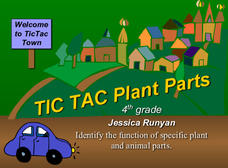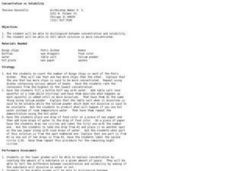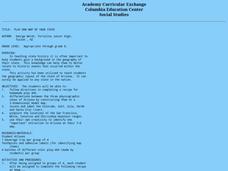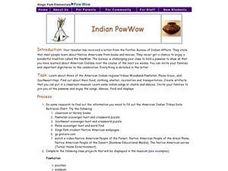Curated OER
Putting Toxicogenomics To The Test
Students evaluate the pros and cons of a new approach to food, chemical, and drug testing. They read and discuss the Times article, 'DNA Chip May Help Usher In a New Era of Product Testing.'
Curated OER
Nutrition: It's In Your Hands
Fourth graders use this lesson plan to focus on their health, nutrition and the state of the environment. In groups, they examine the various types of land, water and air pollutants and compare and contrast a food chain with and without...
Curated OER
Trophic Ecology of Humans
students analyze the place of humans among the tropic levels by observing what we eat. They calculate the caloric content of several foods commonly eaten by humans and calculate the total energy cost to grow, process, transport, store...
Curated OER
Trophic Ecology of Humans
Students analyze the trophic level of humans by first calculating the kilocalories in own their lunch. They then calulate the kilocalories in a wide variety of foods found in grocery stores and compare the kilocalories needed to acquire...
Curated OER
The Euglena and Spirogyra
In this Euglena and Spirogyra learning exercise, learners read about these two Protozoans and they answer fourteen questions about their specified structures and functions. They color a diagram of Euglena and Spirogyra and label their...
Curated OER
Seed to Plant
Young scholars understand the stages of a plants life. In this stages of plant development lesson, students read about bean plants and grow their own. Young scholars record growth and photograph changes in their plants. Students label...
Curated OER
Tic Tac Plant Parts
This plant biology PowerPoint introduces plant parts and their functions. This PowerPoint allows students to identify each plant part on a diagram, along with its' function. The slides contain a clear explanation of how each plant part...
Curated OER
Photosynthesis
For this biology worksheet, students explain where the energy of food originally came from. Then the explain one of the principal chemical compounds that living things use to store energy. Students also describe how ATP and ADP differ...
Curated OER
Concentration vs. Solubility
Students investigate the concentrations of solutions and solubility. For this concentrations and solubility lesson plan, students compare solutions of talcum powder in water and salt in water to have a visual of solubility. They perform...
Curated OER
Too Bee Or Not To Bee
Students recognize that bees are important in the reproduction of plants and to the survival of animals. In this bee lesson, students become familiar with the parts of bees and how those adaptations help them pollinate plants....
Curated OER
Best Breakfast Authors
Third graders write a story. In this breakfast authors lesson, 3rd graders write about a breakfast food and why it is a good selection. Students may illustrate stories and share with their peers.
Curated OER
Play Doh Map of Your State
Young scholars create a state map using Playdoh. In this hands-on state geography lesson, students work in groups to form a three-dimensional map of their state using Playdoh made at home following a (given) recipe. Young scholars...
Curated OER
Plants, Animals and Our Environment
Students draw and label the basic needs of animals. They draw and label the basic needs of plants. Students understand the basic needs of plants and animals are not only the same, but are interrelated. They know that the environment...
Curated OER
Take Deep Breath
Fifth graders become familiar with how the diaphragm expands to draw air into our lungs and contracts to exhale carbon dioxide. They also label the major parts of the respiratory system through the use of interactive Internet research...
Curated OER
The External Anatomy of the Crayfish
Students investigate the external anatomy of a crayfish. In this arthropod lesson plan, students study the structures of the head, the body and the appendages of a crayfish. They locate specific structures present in arthropods and...
Curated OER
Many Uses of Plants
Students research and discuss non-food plant products that are in common use, and mark on a world map the name of the country where the plant is grown.
Curated OER
Native American Blocks
Students research information about a Native American tribe and document their knowledge by creating a block (cube) containing pictures about the homes, tools, food, clothing, and transportation for this tribe.
Curated OER
Plant Pipes
Students work together to discover the path water follows in plants. They create multicolored flowers. They label each part of the plant and note their function.
Curated OER
Social Studies:
Learners identify various types of breads fromother countries and locate them on maps. In small groups, they make story maps of books that mention bread and make books resembling sandwiches. Students have a bread tasting party and...
Curated OER
Indian PowWow
Students identify three different American Indian regions and tribes, their food, clothing, shelter, recreation, and transportation. Students create artifacts that can be placed in a museum. Students sing songs, chants, and dance. ...
Curated OER
The Plymouth Colony
Third graders discuss the book on the pilgrims. They write a poem of the hardships of the boat or on the land. Students write journal entries as a pilgrim on boat or on the land. They complete a collage of the foods that the pilgrims...
Curated OER
Denaturing Proteins
High schoolers investigate how to denature proteins. In this denaturing protein lesson plan, students explore the different ways to denature proteins in the lab. They use heat, acids and bases, organic compounds and heavy metals to...
Curated OER
Groundwater Lab
In this groundwater learning exercise, students simulate a pumping well and a pumping well near an injection well using plastic bottles and dirt. They use food coloring to act as a contaminate to see the movement of food color into the...
Curated OER
Locating Echo
Students read the book The Adventure of Echo the Bat. In this animal science lesson, students read the book and create a chart labeled "Land Feature," "Habitat," and "Food." Students fill in the table according to where the character...























